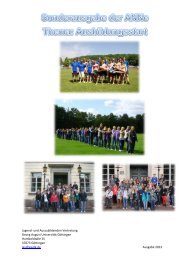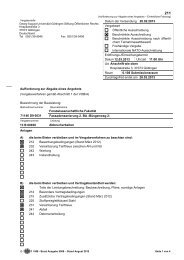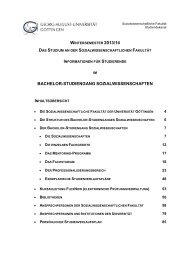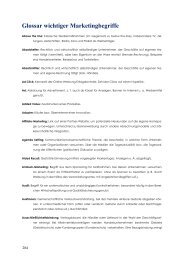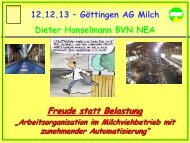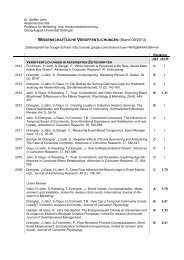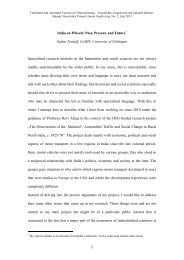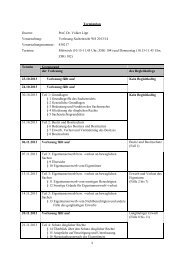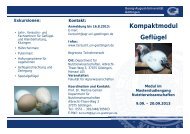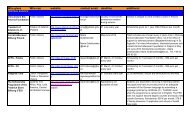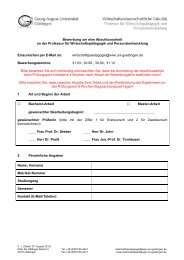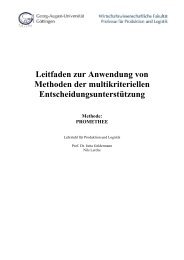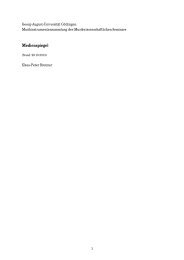CRC 990 - EFForTS - Georg-August-Universität Göttingen
CRC 990 - EFForTS - Georg-August-Universität Göttingen
CRC 990 - EFForTS - Georg-August-Universität Göttingen
You also want an ePaper? Increase the reach of your titles
YUMPU automatically turns print PDFs into web optimized ePapers that Google loves.
<strong>CRC</strong> <strong>990</strong> Ecological and Socioeconomic Functions of Tropical Lowland Rainforest Transformation Systems (Sumatra, Indonesia) Issue 1 / <strong>August</strong> 2013<br />
page 12 von 32<br />
Data Management and Data Sharing (INF Project)<br />
Photo: Sander van der Wel: Young Toucans sharing food, CC-BY-SA, flickr.com<br />
TEAM: Winfried Kurth, Joachim Saborowski, Heike Neuroth,<br />
Fabian Cremer, Thomas Fischer, Tim Ritter<br />
(UGOE), Laksana Tri Handoko, Sandra Yuwana<br />
(LIPI), Heru Sukoco (IPB), Zakky Fathoni (UNJA) ,<br />
Golar Baso (UNTAD)<br />
AIMS: Providing information infrastructure, data base<br />
system, data management, curation and long<br />
term data preservation<br />
CURRENT STATUS:<br />
- The information system <strong>EFForTS</strong>-IS based on<br />
BExIS has been developed and launched<br />
- Data Exchange Agreement has been finalized<br />
Notes on data sharing<br />
If you follow the latest discussions, guidelines or policies<br />
on sharing research data, you will be faced with<br />
what is listed as the huge benefits of sharing research<br />
data in general – like greater visibility, outreach and impact<br />
of your own work including potentially more reputation<br />
and citation; easier verification and replication of<br />
other people’s data; showing integrity and trustworthiness<br />
in science; an improving economical and scientific<br />
efficiency; the fostering of collaborations and the possibilities<br />
for innovative reuse. But when it comes down<br />
to spread and share of the own research data, suddenly<br />
a bunch of formal, technical, ethical, legal, systemic<br />
and even emotional stumbling blocks appear, as one is<br />
realizing the great potentials of reuse come along with<br />
an equally wide range of potential misuses, including<br />
oneself.<br />
By being a big, international, founded, interdisciplinary<br />
and collaborative research project with an ecologically,<br />
socially and economically relevant impact, we have<br />
a rich variety of interests and rights sitting along each<br />
other, vis-à-vis all the national and international laws<br />
and regulations.<br />
The <strong>CRC</strong><strong>990</strong> Data Exchange Agreement (DEA) is meant<br />
to cut into that jungle (not literally!) and to balance<br />
these rights and interest without sacrificing one for the<br />
sake of another. This requires such a document to be<br />
as precise and understandable as possible in order to<br />
be applicable in the field (literally) while being broadly<br />
and open enough in order to fit the dynamic<br />
and heterogeneous nature of this<br />
project.<br />
Regarding this wide scope of the rules and regulations<br />
of the DEA, it should first and foremost serve our <strong>CRC</strong><br />
and all its members a common point of reference and<br />
a reliable base that should carry them around most of<br />
the stumbling blocks mentioned above. With the duet<br />
of DEA and the Information System <strong>EFForTS</strong>-IS our <strong>CRC</strong><br />
has now a legal and technical framework in place which<br />
provides a solid cornerstone for the upcoming fruitful<br />
data sharing.<br />
www.uni-goettingen.de/de/310995.html • crc<strong>990</strong>@gwdg.de • Telephone: +49 551 39-1 21 18<br />
JFB Institute for Zoology & Anthropology • Berliner Strasse 28 • D-37073 <strong>Göttingen</strong>




